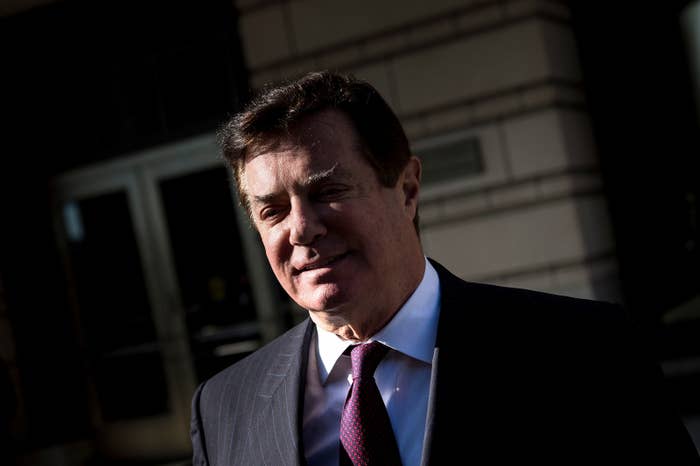
WASHINGTON – Paul Manafort's lawyers made the case for leniency Monday night, arguing in a new sentencing memo that Manafort had been unfairly "vilified" by special counsel Robert Mueller's investigation, and should get far less than the 10 years in prison he faces in one of his criminal cases.
Manafort's lawyers did not advocate for a specific prison term in his DC case, asking that he receive a sentence "substantially below" the maximum penalty. However, in highlighting the toll that pretrial incarceration had taken on Manafort's physical, emotional, and mental health, they noted that courts "routinely" allow defendants "who suffer from serious medical conditions" to serve no prison time at all.
Manafort's lawyers downplayed the seriousness of the crimes Manafort pleaded guilty to — "This case is not about murder, drug cartels, organized crime, the Madoff Ponzi scheme or the collapse of Enron," they wrote — and objected to an argument by prosecutors that Manafort posed a high risk of reoffending. They also argued that notwithstanding a ruling by the judge earlier this month that prosecutors proved Manafort lied after signing his plea deal, he should get credit for pleading guilty and accepting responsibility.
"Mr. Manafort has admitted his wrongdoing before this Court and awaits judgment. The Special Counsel’s attempt to portray him as a lifelong and irredeemable felon is beyond the pale and grossly overstates the facts before this Court," his lawyers wrote.
Manafort pleaded guilty in September 2018 in the US District Court for the District of Columbia to two counts: conspiring to defraud the US government through a variety of financial crimes and failing to report his political consulting work abroad, and conspiring to tamper with witnesses in his case. His sentencing is scheduled for March 13.
In a redacted sentencing memo made public over the weekend, Mueller's office did not advocate for a specific sentence, but urged a stiff punishment, arguing that Manafort poses a "grave risk" of committing more crimes once he is released.
Manafort's lawyers argued in their sentencing memo on Monday that "but for" Mueller's appointment, there was a good chance Manafort wouldn't have faced criminal charges, at least not for his failure to register as an agent for the Ukrainian government; that work predated his time in 2016 as chair of President Donald Trump's campaign. He would have filed the required forms and been done with it, they contend.
"With the appointment of a special prosecutor, however, this [Foreign Agents Registration Act] violation went from what was historically an administrative inquiry and proceeding to a federal criminal case and the public vilification of the defendant," Manafort's lawyers argued.
Much of the proceedings in Manafort's cases have danced around his connection to Trump, but Manafort's lawyers included a section about Manafort's work for the Trump campaign in 2016. They noted that Manafort hadn't been charged in connection with that work, and they quoted the judge in Manafort's Virginia case, who at a hearing last year had said the prosecution was about pressuring Manafort to give up information in the Russia probe. They also repeated a line popular with President Donald Trump: "As said at the beginning of the case," his lawyers wrote, "there is no evidence of Russian collusion."
The sentencing submission quoted Doug Davenport, a political strategist, as saying that Manafort was "ALL-IN" for Trump and "never once (at least to me) ever asked, offered, or suggested any shortcuts or other dirty political tactics – foreign or domestic – to try to further the candidacy of the man who now sits in the most powerful chair on earth."
Manafort's lawyers focused on how rare it was for the government to bring charges under the Foreign Agents Registration Act, and that Manafort was the first person charged with money laundering based on a FARA violation — he was accused of hiding the money he earned overseas and then using it to pay for what prosecutors described as a "lavish lifestyle" in the United States via wire transfers. Manafort's lawyers maintained that he set up foreign banks accounts because his clients wanted him to, not because he intended to use them to avoid US financial reporting rules.
As for the attempts at witness tampering, they argued that the "handful of short or ignored telephone calls and text messages" that Manafort engaged in was less serious than cases where witnesses were bribed or threatened.
The sentencing submission included letters of support from Manafort's family and friends. His lawyers said that some of Manafort's supporters were hesitant to submit letters because they feared "harassment and ridicule," and that Manafort had asked some people not to write on his behalf "out of concern for the potential impact a public filing may have on their personal and/or professional lives."
Manafort is separately facing sentencing in the other case that the special counsel's office brought against him — in the US District Court for the Eastern District of Virginia, where a jury found him guilty last summer of filing false tax returns, failing to report foreign bank accounts, and bank fraud. In the Virginia case, prosecutors argued that Manafort faces an estimated sentencing range of between 19.5 and 24 years in prison, along with a fine of up to $24 million.
Manafort is scheduled for sentencing in Virginia on March 8. When he goes before US District Judge Amy Berman Jackson in DC the following week, Jackson will have the option of stacking her sentence on top of whatever Manafort gets in Virginia, or she can run it concurrently. Manafort's lawyers argued for the latter.

